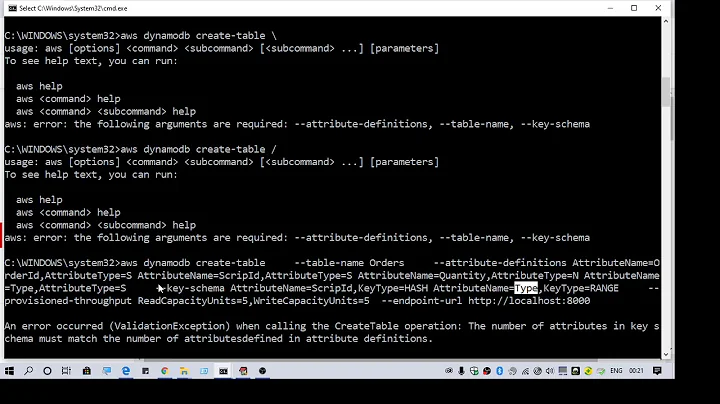Number of attributes in key schema must match the number of attributes defined in attribute definitions
Solution 1
TL;DR Don't include any non-key attribute definitions in AttributeDefinitions.
DynamoDB is schemaless (except the key schema)
That is to say, you do need to specify the key schema (attribute name and type) when you create the table. Well, you don't need to specify any non-key attributes. You can put an item with any attribute later (must include the keys of course).
From the documentation page, the AttributeDefinitions is defined as:
An array of attributes that describe the key schema for the table and indexes.
When you create table, the AttributeDefinitions field is used for the hash and/or range keys only. In your first case, there is hash key only (number 1) while you provide 2 AttributeDefinitions. This is the root cause of the exception.
Solution 2
When you use non-key attribute in at "AttributeDefinitions", you must use it as index, otherwise it's against the way of DynamoDB to work. See the link.
So no need to put a non-key attribute in "AttributeDefinitions" if you're not gonna use it as index or primary key.
var params = {
TableName: 'table_name',
KeySchema: [ // The type of of schema. Must start with a HASH type, with an optional second RANGE.
{ // Required HASH type attribute
AttributeName: 'UserId',
KeyType: 'HASH',
},
{ // Optional RANGE key type for HASH + RANGE tables
AttributeName: 'RemindTime',
KeyType: 'RANGE',
}
],
AttributeDefinitions: [ // The names and types of all primary and index key attributes only
{
AttributeName: 'UserId',
AttributeType: 'S', // (S | N | B) for string, number, binary
},
{
AttributeName: 'RemindTime',
AttributeType: 'S', // (S | N | B) for string, number, binary
},
{
AttributeName: 'AlarmId',
AttributeType: 'S', // (S | N | B) for string, number, binary
},
// ... more attributes ...
],
ProvisionedThroughput: { // required provisioned throughput for the table
ReadCapacityUnits: 1,
WriteCapacityUnits: 1,
},
LocalSecondaryIndexes: [ // optional (list of LocalSecondaryIndex)
{
IndexName: 'index_UserId_AlarmId',
KeySchema: [
{ // Required HASH type attribute - must match the table's HASH key attribute name
AttributeName: 'UserId',
KeyType: 'HASH',
},
{ // alternate RANGE key attribute for the secondary index
AttributeName: 'AlarmId',
KeyType: 'RANGE',
}
],
Projection: { // required
ProjectionType: 'ALL', // (ALL | KEYS_ONLY | INCLUDE)
},
},
// ... more local secondary indexes ...
],
};
dynamodb.createTable(params, function(err, data) {
if (err) ppJson(err); // an error occurred
else ppJson(data); // successful response
});```
Solution 3
Declare attributes in AttrubuteDefinitions only if you are going to use the attribute in KeySchema
OR
when those attributes are going to be used in GlobalSecondaryIndexes or LocalSecondaryIndexes
For anybody using yaml files:
Example 1:
Lets say you have 3 attributes -> id, status, createdAt.
Here id is the KeySchema
AuctionsTable:
Type: AWS::DynamoDB::Table
Properties:
TableName: AuctionsTable
BillingMode: PAY_PER_REQUEST
AttributeDefinitions:
- AttributeName: id
AttributeType: S
KeySchema:
- AttributeName: id
KeyType: HASH
Example2:
For the same attributes(ie. id, status and createdAt) if you have GlobalSecondaryIndexes or LocalSecondaryIndexes as well, then your yaml file looks like:
AuctionsTable:
Type: AWS::DynamoDB::Table
Properties:
TableName: AuctionsTable-${self:provider.stage}
BillingMode: PAY_PER_REQUEST
AttributeDefinitions:
- AttributeName: id
AttributeType: S
- AttributeName: status
AttributeType: S
- AttributeName: endingAt
AttributeType: S
KeySchema:
- AttributeName: id
KeyType: HASH
GlobalSecondaryIndexes:
- IndexName: statusAndEndDate
KeySchema:
- AttributeName: status
KeyType: HASH
- AttributeName: endingAt
KeyType: RANGE
Projection:
ProjectionType: ALL
We have included status and createdId in AttributeDefinitions only because we have a GlobalSecondaryIndex which uses the aforementioned attributes.
Reason: DynamoDB only cares about the Primary Key, GlobalSecondaryIndex and LocalSecondaryIndex. You don't need to specify any other types of attributes which are not part of the above mentioned trio.
DynamoDB is only concerned with Primary Key, GlobalSecondaryIndex and LocalSecondaryIndex for partitioning. It doesn't care what other attributes you have for an item.
Solution 4
I also had this problem and I'll post here what went wrong for me in case it helps someone else.
In my CreateTableRequest, I had an empty array for the GlobalSecondaryIndexes.
CreateTableRequest createTableRequest = new CreateTableRequest
{
TableName = TableName,
ProvisionedThroughput = new ProvisionedThroughput { ReadCapacityUnits = 2, WriteCapacityUnits = 2 },
KeySchema = new List<KeySchemaElement>
{
new KeySchemaElement
{
AttributeName = "Field1",
KeyType = KeyType.HASH
},
new KeySchemaElement
{
AttributeName = "Field2",
KeyType = KeyType.RANGE
}
},
AttributeDefinitions = new List<AttributeDefinition>()
{
new AttributeDefinition
{
AttributeName = "Field1",
AttributeType = ScalarAttributeType.S
},
new AttributeDefinition
{
AttributeName = "Field2",
AttributeType = ScalarAttributeType.S
}
},
//GlobalSecondaryIndexes = new List<GlobalSecondaryIndex>
//{
//}
};
Commenting out these lines in the table creation solved my problem. So I guess the list has to be null, not empty.
Related videos on Youtube
NAbbas
Updated on July 08, 2022Comments
-
NAbbas almost 2 years
I’m trying to create a simple table using DynamoDB JavaScript shell and I’m getting this exception:
{ "message": "The number of attributes in key schema must match the number of attributes defined in attribute definitions.", "code": "ValidationException", "time": "2015-06-16T10:24:23.319Z", "statusCode": 400, "retryable": false }Below is the table I’m trying to create:
var params = { TableName: 'table_name', KeySchema: [ { AttributeName: 'hash_key_attribute_name', KeyType: 'HASH' } ], AttributeDefinitions: [ { AttributeName: 'hash_key_attribute_name', AttributeType: 'S' }, { AttributeName: 'attribute_name_1', AttributeType: 'S' } ], ProvisionedThroughput: { ReadCapacityUnits: 1, WriteCapacityUnits: 1 } }; dynamodb.createTable(params, function(err, data) { if (err) print(err); else print(data); });However if I add the second attribute to the
KeySchema, it works fine. Below a the working table:var params = { TableName: 'table_name', KeySchema: [ { AttributeName: 'hash_key_attribute_name', KeyType: 'HASH' }, { AttributeName: 'attribute_name_1', KeyType: 'RANGE' } ], AttributeDefinitions: [ { AttributeName: 'hash_key_attribute_name', AttributeType: 'S' }, { AttributeName: 'attribute_name_1', AttributeType: 'S' } ], ProvisionedThroughput: { ReadCapacityUnits: 1, WriteCapacityUnits: 1 } }; dynamodb.createTable(params, function(err, data) { if (err) print(err); else print(data); });I don’t want to add the range to key schema. Any idea how to fix it?
-
 mkobit almost 9 yearsDoes this only happen against DynamoDBLocal? What happens when you try to do the same thing against the actual service?
mkobit almost 9 yearsDoes this only happen against DynamoDBLocal? What happens when you try to do the same thing against the actual service? -
NAbbas almost 9 yearsI don't have a AWS account yet, so couldn't test it against actual service. I'm using the latest version of DynamoDB local (dynamodb_local_2015-04-27_1.0).
-
Chris almost 8 yearsI'm experiencing the same behavior with dynamodb_local_2016-04-19
-
Chris almost 8 yearsNevermind, Mingliang's TL;DR says it all.
-
-
 Srle about 8 yearswith one exception i believe, non-key attribute should be in
Srle about 8 yearswith one exception i believe, non-key attribute should be inAttributeDefinitionsif that key will be used ashashorrangekey in index -
Ryan almost 3 yearsif this is true then how do I add a TTL field which is not in an index?
-
 Mike DeMille almost 3 years
Mike DeMille almost 3 years








